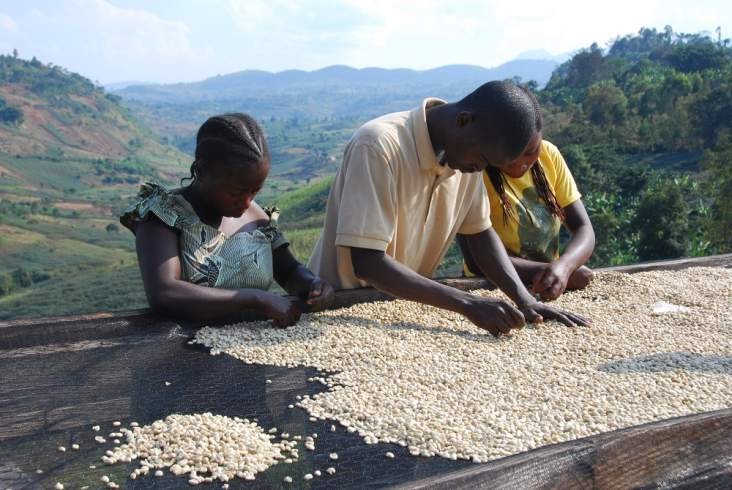
March 2016—Once home to a thriving coffee industry, the Democratic Republic of the Congo (DRC) saw coffee production and export steadily decline during recent decades of instability and conflict. Now, with international demand for specialty coffee at an all-time high, the country is reviving its coffee sector and starting to regain its place as a leading coffee producer.
Through a USAID-funded partnership in the province of South Kivu, coffee farmer cooperatives are improving the production of coffee cherries—from harvesting to market delivery to finding international buyers. Coffee farmers are learning about the right moment to pick their coffee cherries, which, like any other fruit, must be picked at peak ripeness for best taste.
Knowledge like this separates low-value coffee from high-value specialty coffee, bringing in a better price in the international market.
The work has borne fruit. With new business skills under their belt, the cooperatives have negotiated a pre-harvest financing agreement with Westrock Coffee, which means that farmers are paid up front for their cherries at the time of harvest.
In 2015, South Kivu coffee cooperatives received high rankings at the first international coffee cupping competition held in the DRC.
“I am … trying to get my hands on as much of this coffee as possible, and I have no doubt there are buyers lined up trying to get it,” said Timothy Fella, one of the international judges at the competition and a coffee buyer for U.S. roaster and retailer Counter Culture Coffee.
The cooperatives sold a total of five shipping containers of fully washed coffee beans to U.S. coffee retailers Starbucks, Counter Culture Coffee, Sweet Marias and other buyers. The beans will be packaged and labeled as single-origin Congolese coffee.
These sales represent the beginning of a new era for these Congolese coffee farmers. Now that they are making international sales at higher prices, local traders give them better deals on the rest of their coffee harvest as well.
“In the past, we didn’t know how to sell our coffee. We could only sell it to Rwanda,” says Constantin Kasikagwe Mukuba, a coffee farmer who cultivates 141 trees on a quarter-hectare plot in South Kivu. To get to the coffee market in Rwanda, coffee farmers had to undertake a treacherous journey across a large lake separating the two countries, a journey that often resulted in drowning.
Now that farmers like Mukuba no longer feel the pressure to export illegally, those days of risky lake crossings are gone.
To further professionalize the sector, USAID has helped construct a coffee-tasting laboratory in Bukavu, the first facility of its kind in South Kivu. Under the management of the Office Nationale du Café, the laboratory will allow government regulators to certify coffee quality before shipping and provide further training to coffee farmers. Staff from the office as well as coffee farmers learn world-standard techniques for tasting coffee to determine its quality, a skill vital to the re-launch of the coffee sector in the DRC.
The improved coffee production, enhanced local livelihoods, and coffee laboratory result from the Kivu Specialty Coffee: Kahawa Bora Ya Kivu project funded by USAID and the Howard G. Buffet Foundation. Implemented by Catholic Relief Services, the Eastern Congo Initiative, and World Coffee Research, the four-year project began in 2012. It improves livelihoods of smallholder coffee farmers, strengthens farmer cooperatives as business operations, reforms government policies and implementation to promote growth in coffee exports, and builds the brand of Congolese coffee among international consumers.
As farmers learn how to attract buyers from the United States, Europe and even Korea, they express a greater sense of professionalism and pride.
“Now we have everything we need here,” Mukuba said. “Thanks to the fields, I can educate my children. I can feed my family.”







Comment
Make a general inquiry or suggest an improvement.